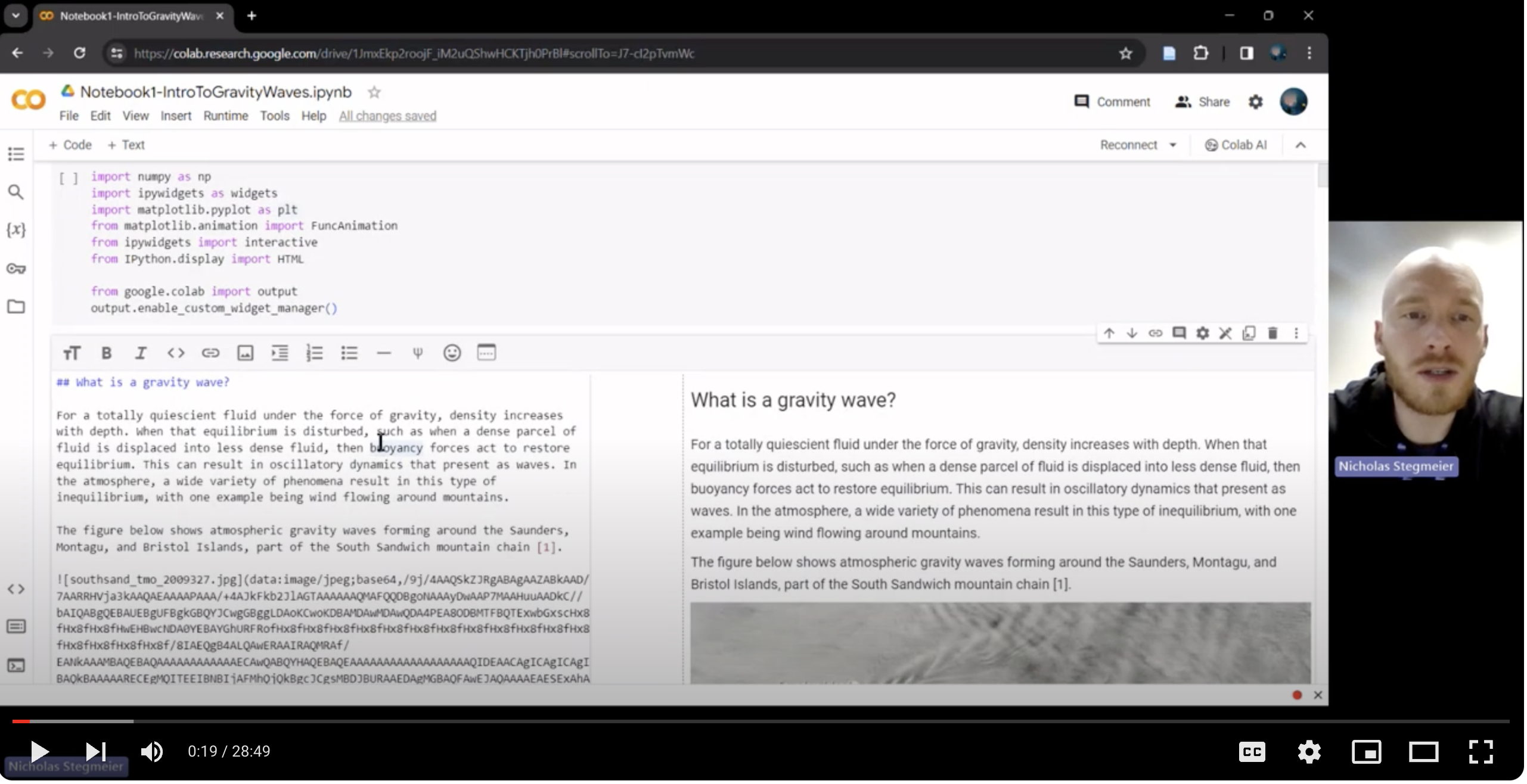Engineering Lesson 16: Gravity Wave Analysis
Overview of the content
To better understand the Engineering Gravity Wave Analysis below are some resources to get you started in Fall 2023. We will be providing code for analysis if your team wants to analyze your own data.
An extensive learning unit will be provided after the holiday break that walks those interested through the details of this analysis.
Additional information and resources will be provided as they become available, so check back soon.
See also Lesson 5 on Weather, Earth's atmosphere, and atmospheric gravity waves.
Gravity Wave Analysis (new, posted January 2024)

General Overview Notebook and YouTube video (BOTH NEW ITEMS)
Notebook link (See instructions below for opening with Google Colaboratory)
Videos for Notebook 1, Notebook 3 and Notebook 4
The best way to share these notebooks is as read-only files that people can download onto their own Google Drive. To be safe, we created another shared folder where all the files are read-only for others.
Here are instructions for running any of the notebooks:
How to access the NEBP Gravity Wave Instructional Notebooks:
If you have used Google Colaboratory before:
- Click the notebook Google Drive link.
- Click "Open with Colaboratory " at the top center of the window.
If you have not used Google Colaboratory before:
- Click the notebook Google Drive link.
- Click "Open with" at the top center of the window.
- Click "Connect more apps". Search for and install Colaboratory.
- Once Colaboratory is installed, click "Open with Colaboratory" at the top center of the window.
Individual links to the notebooks:
Notebook 1 - Introduction to Gravity Waves
Notebook 2 - Introduction to Fourier Analysis
Notebook 3 - Gravity Wave Analysis Example 1
Notebook 4 - Gravity Wave Analysis Example 2
There are also two datasets used for these notebooks, but it's not necessary to download them separately. Nonetheless, they are available for exploration:
Notebook 4 - Example GPS Data:
Additional resources
Books
Introduction to Atmospheric Gravity Waves by Nappo. Free copies of this book may be available online.
Gravity Wave Methods Overview. Download from the NEBP Education Google Drive
Citizen science project
Surfs up! It’s time to catch an atmospheric wave as we launch Gravity Wave Zoo!
In Gravity Wave Zoo, we ask you to identify gravity waves, instabilities, and aurora in short video clips. The pictures were taken using a camera that views in the infrared, equipped with a fisheye lens, so they show the detail in a large part of the sky. Classifying these events will help us understand how energy is transported through the atmosphere. Anyone can do Gravity Wave Zoo, and there is not always a "right" answer. If you're not sure, just take your best guess!
Posters
Gravity Wave Detection in the Stratosphere using High Altitude Balloon GPS Data
Authors: Nicholas Stegmeier (South Dakota State University),Marybeth Catlett (Montana State University), SarahGordon (University of Wyoming), BryceKim (MSGC BOREALIS), RandalLarimer (Montana Space Grant Consortium).
Won first place last year at the Academic High Altitude Conference (AHAC)
Publications
NEW - posted 1/24/24. "Application of balloon-borne high precision GPS for inertia gravity wave characterization” by Bryce Kim and Randy Larimer
Physics and overview of gravity waves
Fritts, D. C., and Alexander, M. J. Gravity wave dynamics and effects in the middle atmosphere,Rev. Geophys., 41, 1003, https://doi:10.1029/2001RG000106, (2003)
Overview of various approaches
Zhang, S. D., Yi, F., Huang, C. M., & Huang, K. M. High vertical resolution analyses of gravity
waves and turbulence at a midlatitude station. J. Geophys. Res., 117, D02103.
https://doi.org/10.1029/2011JD016587 (2012)
Fourier analysis
Gong, J., and M. A. Geller. Vertical fluctuation energy in United States high vertical resolution
radiosonde data as an indicator of convective gravity wave sources. J. Geophys. Res.,
115, D1110. https://doi.org/10.1029/2009JD012265 (2010)
Hodograph
Hirota, I., and T. Niki. A statistical study of inertia-gravity waves in the middle atmosphere. J.
Meteor. Soc. Japan, 63,1055-1066. https://doi.org/10.2151/jmsj1965.63.6_1055 (1985)
Guest, F. M., M. J. Reeder, C. J. Marks, and D. J. Karoly. Inertia-gravity waves observed in the
lower stratosphere over Macquarie Island. J. Atmos. Sci., 57, 737-752.
https://doi.org/10.1175/1520-0469(2000)057<0737:IGWOIT>2.0.CO;2 (2000).
Polarization (overlaps with hodograph)
Eckermann, S. D. Hodographic analysis of gravity waves: Relationships among Stokes
parameters, rotary spectra and cross-spectral methods. J. Geophys. Res., 101, D14,
19169-19174. https://doi.org/10.1029/96JD01578 (1996).
